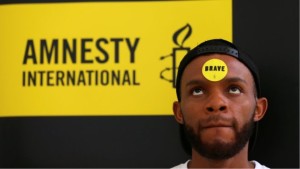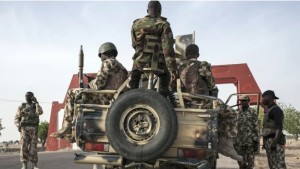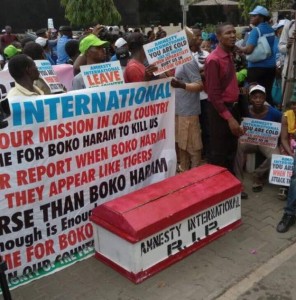July 2017
- Posting by PRAWA
- Int'l News

In our series of letters from African journalists, novelist and writer Adaobi Tricia Nwaubani explores the constant war of words between the Nigerian military and the rights group Amnesty International.
If the Nigerian military were to draw up a list of its enemies, Amnesty International might feature near the top, perhaps a name or two below Islamist militants Boko Haram.
However, while the Nigerian military continues its protracted battle against Boko Haram with arms and ammunition, its even longer war with Amnesty International is with words.
Clashes that are often covered in Nigeria’s media, with headlines such as:
Amnesty vs Nigerian army: Who is telling the truth?
You Are A Liar, Nigerian Army Tells Amnesty International
Nigerian Army and Amnesty International clash over report
The international rights body has repeatedly accused the Nigerian government of ignoring calls to conduct independent investigations into its reports.
The Nigerian army in turn has accused Amnesty International of being sponsored by politicians and fifth columnists who are out to damage the country’s reputation.

In one of its reports, published in February, Amnesty alleged human rights abuses had been committed by Nigerian security agencies.
The abuses were not only during the fight against Boko Haram militants but also in the armed forces’ quelling of protests in other parts of the country.
“There was continued lack of accountability for serious human rights violations committed by security officers.
“No independent and impartial investigations into crimes committed by the military had taken place despite the president’s repeated promises in May.
“Moreover, senior military officials alleged to have committed crimes under international law remained uninvestigated,” the organisation stated.
‘Heinous Intent’
The Nigerian army’s response was that the human rights NGO was bent on tarnishing their reputation, and went on to state: “For the umpteenth time, the Nigerian Army has informed the public about the heinous intent of this non-governmental organisation which is never relenting in dabbling into our national security in manners that obliterate objectivity, fairness and simple logic.”
After the report was published, a group of protesters barricaded the Abuja office of Amnesty International and demanded that the organisation quit Nigeria within 24 hours.
They called on Nigerians to “join the movement to get this evil out of our land before it plunges us into real war.”
The protestors further said “Unfortunately, if this organisation is allowed to continue carrying out its atrocities here it will destabilise Nigeria”
And they went on to add this ominous warning, “We would be left without a country and we would not be welcomed in other nations. We will become mere footnotes in its next annual report since it stops showing interest in places it has successfully destroyed.”

In Nigeria, gathering a crowd to cause a stir on one’s behalf is only a matter of cash, so few people took the protesters seriously.
However some civil society groups and human rights organisations in Nigeria openly condemned the protests.
They challenged the military to take the criticisms objectively rather than dismissing them outright.
“The facts and figures contained in Amnesty International’s report have not been disputed or shown not to be correct or concocted,” said the national coordinator of one of the groups.
Response to Amnesty challenge
Much to everyone’s surprise the Nigerian military took up this challenge, this time going beyond issuing strong denials and bombastic press statements to actually setting up a board to investigate the Amnesty report.
Three months later, the board has made known its findings.

“Nigerians bemused by the differing accounts of the same events remain divided as to whom exactly to believe.“
Their verdict? The army is not guilty of the accusations.
It, however, noted areas where the army could improve, such as in allowing Boko Haram suspects access to legal representation.
“The board found that a common feature in all the detention facilities visited was the delay in the legal processing and trial of Boko Haram detainees,” a spokesperson for the board said.
Amnesty International is not happy with this outcome. And so, the war of words continues.
“We stand by the findings of our research and our call for an investigation that is independent, impartial and thorough; criteria that this panel clearly does not meet,” the organisation said.
In the meantime, Nigerians, bemused by the accusations and counter-accusations, and the differing accounts of the same events, remain divided as to whom exactly to believe.
Conveyed by: BBC
